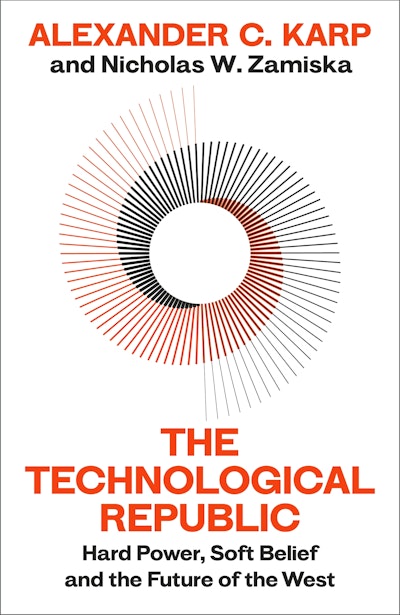- Published: 15 April 2025
- ISBN: 9781847928535
- Imprint: Bodley Head
- Format: Trade Paperback
- Pages: 320
- RRP: $36.99
The Technological Republic
Hard Power, Soft Belief, and the Future of the West
- Published: 15 April 2025
- ISBN: 9781847928535
- Imprint: Bodley Head
- Format: Trade Paperback
- Pages: 320
- RRP: $36.99
The wizards of America’s digital revolution have produced many shiny consumer products and apps. But they have often remained aloof from engaging in a sense of national purpose or common good. This book is a rallying cry, as we enter the age of artificial intelligence, for a return to the World War II era of cooperation between the technology industry and government in order to pursue innovation that will advance our national welfare and democratic goals. A fascinating and important work
Walter Isaacson
[The Technological Republic] help[s] explain the sudden and extraordinary change of worldview that has seized much of the US tech elite… a fascinating, if at times disturbing, insight into the reassertion of US hard power
Financial Times
A cri de coeur that takes aim at the tech industry for abandoning its history of helping America and its allies... Likely the only book by a business executive to feature three epigrams (one in German), citations from the Bible, Richard Linklater's Before Sunset, and an outright attack on a market leader
Wall Street Journal
Equal parts company lore, jeremiad, and homily... The primary target of The Technological Republic is not a nation that has failed Silicon Valley. It is more cogent and original as a story about how Silicon Valley has failed the nation
New Yorker
As clear and bracing as reveille... with engaging storytelling... Whether or not Americans can agree on how and why to defend the country, Karp and Zamiska make a stirring call for the tech industry to follow Palantir's path and get involved with the effort
Washington Post
A bold and ambitious work, The Technological Republic reminds us of a time when technological progress answered a national calling. It is essential reading in the age of AI, as the direction of Silicon Valley will help define the future of American leadership in the world
Eric Schmidt
In today's complicated geopolitical, technological, and economic environment, the author's ability to be both well spoken and outspoken in The Technological Republic can help us understand important issues about the future prosperity of the United States and its allies. The book is by turns provocative and insightful, and Alex Karp's resilience, patriotism, and depth of experience in our rapidly changing world provide instructive lessons and intellectual arguments for all of us to consider
Jamie Dimon
This is an extremely important book and a gift to every American interested in the future path of our nation. Alex Karp is a brilliant out-of-consensus visionary who has built one of the most consequential companies in America. His insight into how he did so and how we should allocate future defence spending and what role our leading technology companies should play in helping defend our nation against hostile adversaries is both provocative and invaluable
Stanley Druckenmiller
The Technological Republic should be read by everyone who cares about how technology should contribute to the protection of American values and our security. Karp is a true patriot- a loving critic of his industry and his country who wants them both to be better
General James N. Mattis
Not since Allan Bloom’s astonishingly successful 1987 book The Closing of the American Mind — more than 1 million copies sold — has there been a cultural critique as sweeping as Karp’s
Washington Post
Timely and unsettling
Observer
The Technological Republic sets out their [Karp's and Zamiska's] vision – compelling, contentious, flawed – for how to meet that challenge [of AI]. It is far too important to ignore
Times Literary Supplement
A surprising book ... nuanced and provocative. Even the most ardent pacifist should consider the arguments in it
Irish Times





